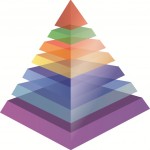Toward A More Meaningful Ushpizin
Click here for PDF: Ushpizin Printout
On Sukkot, we commemorate Israel’s dwelling in the desert in sukkahs with G-d’s protection. There is a custom to welcome the seven Usphizin (spiritual guests) into our Sukkah. These great Biblical leaders each match up with a kabbalistic middah/sefirah (attribute/concept). I believe that we do not literally welcome these great guests into our Sukkahs, but that each one and his respective sefirah match up with a specific way in which G-d influenced us and helped us to develop into a nation in the desert.
By welcoming in one of these great Shepherds, we recall one type of way that G-d positively impacted us.Below is a list of the concepts that match up with events in Israel’s trek through the desert, with the Hebrew prayers that one says on each night of Sukkot at the very bottom. You can print out this page and use it on sukkot to say the Ushpizin Prayer and share words of Torah that will, hopefully, spark fruitful conversation.

Avraham/Sarah & Chesed: This famous word does not solely mean kindness, it means ‘to sustain life and promote life’s existence’. It relates to how G-d sustained us in the desert through different means: the manna, a mobile water well, clouds of protection against enemies, and more. Those who elucidate kabbalah have portrayed this middah as the growth stage of a rose bush’s cyclical development.
Yitzchak/Avigail & Gevurah: Gevurah is a middah that is related to judgment (din). It works as a mechanism to zero in on negative components and weed them out. As such, this idea parallels, among other things, the phenomenon that when people do despicable deeds, they receive negative consequences. This can be conceptualized as a rose bush being trimmed. If one does not trim a rose bush, it will die from having too much growth to support and too much dead matter still imbedded in the plant. Israel, as we read about the nation in the Torah, has many incidences when it, or, more accurately, parts of it do despicable deeds. These specific perpetrators are weeded out to preserve the healthy parts of Israel. As difficult as it is to hear about, it is necessary for the healthy survival of the nation.

In addition, Israel needs physical borders and boundaries to survive. Any group of persons that joins together inevitably makes rules to maintain their connectedness. This may sound quite paradoxical, as groups often form to engage in pure recreation (chesed), as with social clubs, or to commit crimes (anti-gevurah), as with gangs. However, there is no escaping the need for rules to maintain the essential connectedness of an organization – however oxymoronic that sounds. All lasting groups have rules.
In the desert, G-d commanded Israel to use religious items of representational significance, and the concept that we must find deep meaning (chesed) within our commandments and customs, but that we can never abrogate the technical requirement to do the law (gevurah/din). Actions that are based on items that have symbolic meaning are called rituals by psychologists, and are extremely important to the ongoing connectedness and health of a family or organization.
Moshe/Devorah & Netzach: Israel was given morals, values, and religious commandments to live by, in the desert. These relate to the middah netzach, which means eternal – as in eternal values – and relates to morals. As these concepts relate to Moshe and his contribution and facilitation of these important components, he is identified with this middah. These morals were given through the authority of the Torah, with certain laws being given before or after the theophany at Mt Sinai by Israel’s leaders, but the authority still stemming from G-d’s decision that the Torah and Moshe’s words that relate to it are the root of binding law. This middah also teaches that education is important and that people need to study, teach others and develop their intellect.
 Interestingly, most groups that humans form end up agreeing on adding a higher purpose to their union. A seemingly recreational men’s club feels it important to donate and raise money for a particular charitable cause. I find it quite fascinating that Hells Angels motorcycle clubs, understood to be an Outlaw Motorcycle Gang by the National Gang Threat Assessment and the Bureau of Justice Assistance, officially “have runs to raise money for local charities” (taken from their official website-red coloring their own) and that each local chapter has a commitment to charitable benevolence.
Interestingly, most groups that humans form end up agreeing on adding a higher purpose to their union. A seemingly recreational men’s club feels it important to donate and raise money for a particular charitable cause. I find it quite fascinating that Hells Angels motorcycle clubs, understood to be an Outlaw Motorcycle Gang by the National Gang Threat Assessment and the Bureau of Justice Assistance, officially “have runs to raise money for local charities” (taken from their official website-red coloring their own) and that each local chapter has a commitment to charitable benevolence.
Aharon/Miriam & Hod: Hod, as personified by Aharon, teaches us that each individual has importance, even within a large group. The individual’s achievement is not competition, but the glory of one person’s accomplishment, which, in reality, is good for the group. There were many individuals who contributed to Israel in the desert, such as Pinchas, Yehoshua, the daughters of Tzlofchad, and Calev. These people used their free will to contribute to Israel’s success, but we must knowledge G-d’s facilitation of these achievements, as well.
As a related concept, hod brings us the importance of interpersonal harmony and the importance of caring for others. This caring, as demonstrated by Aharon, the hod archetype, is rooted in our emotion of empathy, and reminds us that we need to take into consideration others’ feelings. We must assist others with their emotional health and support and empathize with them, as Aharon does in the midrash. The clouds that G-d uses to protect Israel in the desert relate not only to chesed but to this sefirah, as well. This is due to the fact that the clouds took preventative measures to ensure that Israel would be safe, have a easy trek, and that their clothing was in order. Many commandments that Israel receives at Sinai are related to the interpersonal realm. If we do these actions we will mirror Aharon, G-d through the command of imitating Him, imitatio dei, and quite clearly help our fellow man.
Yosef/Chulda & Yesod: Yosef’s contribution in his life and to Israel is the middah of yesod, which involves connecting disparate components together. Israel, as a nation, must be organized and have its parts interconnected. The whole Book of Bamidbar reflects the national
 middah of yesod developing from non-existent to fully connected and organized. Israel can be understood to have been more susceptible to the troublesome incidences that occurred in the desert (Korach, the spies, Bilam) due to the fact that it had breakdowns in its yesod sefirah order in Bamidbar. It was not fully organized and led with yesod-type assertiveness, and certain perpetrators took advantage of that.
middah of yesod developing from non-existent to fully connected and organized. Israel can be understood to have been more susceptible to the troublesome incidences that occurred in the desert (Korach, the spies, Bilam) due to the fact that it had breakdowns in its yesod sefirah order in Bamidbar. It was not fully organized and led with yesod-type assertiveness, and certain perpetrators took advantage of that.David/Chana & Malchut: Once Israel is organized and its parts are working from the yesod middah, it becomes a systematic anthill-like group that needs little direction to function. Things appear to happen automatically. The direction it needs is given by its king, who totally commits to serving the people and is the sole executor or their will. Though Moshe and Yehoshua are understood by many midrashim and commentaries to have the status of king and function as such, this sefirah is not fully achieved in its purest form in the desert.
That having been said, many kabbalistic sources label the Book of Devarim “The Book of Malchut”, in that parts of the book prepare Israel for war and map out the physical boundaries of the future settling in the Land of Israel, among other reasons. Unfortunately, many more years pass until Israel is led by David, and the lack of full connectedness and synergy is palpable in the books of Joshua, Judges, and much of Samuel. We do not live in a perfect world, nor have we ever; it is up to us to do what we can: to do tikkkun (significant, profound improvement) to improve ourselves, families and communities and hope that this compounds and ripples forth, with Divine Assistance, to push Israel and the world in the right direction.
Ultimately, malchut teaches us that we must recognize that G-d is the true king, with complete dominion over all, which is an important message during this season. May we see, speedily in out days, proper malchut with all components of Israel functioning properly together.

Ushpizin Prayer in Hebrew with Vowels-The Underlined Lines are the Essential Ones
תִּיבוּ תִּיבוּ אוּשְׁפִּיזִין עִילָאִין, תִּיבוּ תִּיבוּ אוּשְׁפִּיזִין קַדִּישִׁין, תִּיבוּ תִּיבוּ אוּשְׁפִּיזִין דִמְהֵימְנוּתָא, זַכָּאָה חוּלְקֵיהוֹן דְיִשְֹרָאֵל דִּכְתִיב כִּי חֵלֶק יְדוָד עַמּוֹ יַעֲקֹב חֶבֶל נַחֲלָתוֹ: יְהִי רָצוֹן מִלְּפָנֶיךָ יְדוָד אֱלֹהַי וֵאלֹהֵי אֲבוֹתַי שֶׁתַּשְׁרֶה שְׁכִינָתְךָ בּינֵינוּ וְתִפְרוֹס עָלֵינוּ סֻכַּת שְׁלוֹמֶךָ בִּזְכוּת מִצְוַת סֻכָּה שֶׁאֲנַחְנוּ מְקַיְּמִין לְיַחְדָא שְׁמָא דְקוּדְשָׁא בְּרִיךְ הוּא וּשְׁכִינְתֵּהּ בִּדְחִילוּ וּרְחִימוּ לְיַחֲדָא שֵׁם י”ה בו”ה בְּיִחוּדָא שְׁלִים בְּשֵׁם כָּל יִשְֹרָאֵל, וּלְהַקִּיף אוֹתָם מִזִּיו כְּבוֹדֶךָ הַקָּדוֹשׁ וְהַטָּהוֹר נָטוּי עַל רָאשֵׁיהֶם מִלְּמָעְלָה כְּנֶשֶׁר יָעִיר קִנּוֹ, וּמִשָּׁם יוּשְׁפַּע שֶׁפַע הַחַיִּים לְעַבְדֶּךָ (פב”פ אֲמָתֶךָ). וּבִזְכוּת צֵאתִי מִבֵּיתִי הַחוּצָה וְדֶרֶךְ מִצְוֹתֶיךָ אָרוּצָה יֵחָשֵׁב לִי זֹאת כְּאִלּוּ הִרְחַקְתִּי נְדוֹד, וְהֶרֶב כַּבְּסֵנִי מֵעֲוֹנִי וּמֵחַטָּאתִי טַהֲרֵנִי, וּמֵאוּשְׁפִּיזִין עִלָּאִין אוּשְׁפִּיזִין דִּמְהֵימְנוּתָא תִּהְיֶינָה אָזְנֶיךָ קַשּׁוּבוֹת רַב בְּרָכוֹת, וְלָרְעֵבִים גַּם צְמֵאִים תֶּן לַחְמָם וּמֵימָם הַנֶּאֱמָנִים, וְתִתֶּן לִי זְכוּת לָשֶׁבֶת וְלַחֲסוֹת בְּסֵתֶר צֵל כְּנָפֶךָ בְּעֵת פְּטִירָתִי מִן הָעוֹלָם, וְלַחֲסוֹת מִזֶּרֶם וּמִמָּטָר, כִּי תַמְטִיר עַל רְשָׁעִים פַּחִים, וּתְהֵא חֲשׁוּבָה מִצְוַת סֻכָּה זוּ שֶׁאֲנִי מְקַיֵּם כְּאִלּוּ קִיַּמְתִּיהָ בְּכָל פְּרָטֶיהָ וְדִקְדּוּקֶיהָ וּתְנָאֶיהָ וְכָל מִצְוֹת הַתְּלוּיִם בָּהּ. וְתֵיטִיב לָנוּ הַחֲתִימָה, וּתְזַכֵּנוּ לֵישֵׁב יָמִים רַבִּים עַל הָאֲדָמָה אַדְמַת קֹדֶשׁ בַּעֲבוֹדָתֶךָ וּבְיִרְאָתֶךָ. בָּרוּךְ יְדוָד לְעוֹלָם אָמֵן וְאָמֵן:
בליל ראשון כשנכנס לסוכה קודם שישב לאכול ובכל יום קודם סעודתו יאמר זה: Each night, (preferably before you eat) say the following phrase before each Ushpizin guest :
אֲזַמִין לִסְעוּדָתִי אוּשְׁפִּיזִין עִילָאִין אַבְרָהָם יִצְחָק יַעֲקֹב מֹשֶׁה אַהֲרֹן יוֹסֵף וְדָּוִד:
then..
ביום הראשון אומר On the first day
בְּמָטֵוּ מִינָךְ אַבְרָהָם אוּשְׁפִּיזִי עִילָאִי דְיַתְבֵי עִמִּי וְעִמָּךְ כָּל אוּשְׁפִּיזֵי עִילָאִי יִצְחָק יַעֲקֹב מֹשֶׁה אַהֲרֹן יוֹסֵף וְדָּוִד:
ביום השני אומר: On the second day
בְּמָטֵוּ מִינָךְ יִצְחָק אוּשְׁפִּיזִי עִילָאִי דְיַתְבֵי עִמִּי וְעִמָּךְ כָּל אוּשְׁפִּיזֵי עִילָאִי אַבְרָהָם יַעֲקֹב מֹשֶׁה אַהֲרֹן יוֹסֵף וְדָּוִד:
ביום השלישי אומר On the third day:
בְּמָטֵוּ מִינָךְ יַעֲקֹב אוּשְׁפִּיזִי עִילָאִי דְיַתְבֵי עִמִּי וְעִמָּךְ כָּל אוּשְׁפִּיזֵי עִילָאִי אַבְרָהָם יִצְחָק מֹשֶׁה אַהֲרֹן יוֹסֵף וְדָּוִד:
ביום הרביעי אומר On the fourth day:
בְּמָטֵוּ מִינָךְ מֹשֶׁה אוּשְׁפִּיזִי עִילָאִי דְיַתְבֵי עִמִּי וְעִמָּךְ כָּל אוּשְׁפִּיזֵי עִילָאִי אַבְרָהָם יִצְחָק יַעֲקֹב אַהֲרֹן יוֹסֵף וְדָּוִד:
ביום החמישי אומר: On the fifth day
בְּמָטֵוּ מִינָךְ אַהֲרֹן אוּשְׁפִּיזִי עִילָאִי דְיַתְבֵי עִמִּי וְעִמָּךְ כָּל אוּשְׁפִּיזֵי עִילָאִי אַבְרָהָם יִצְחָק יַעֲקֹב מֹשֶׁה יוֹסֵף וְדָּוִד:
ביום הששי אומר: On the sixth day
בְּמָטֵוּ מִינָךְ יוֹסֵף אוּשְׁפִּיזִי עִילָאִי דְיַתְבֵי עִמִּי וְעִמָּךְ כָּל אוּשְׁפִּיזֵי עִילָאִי אַבְרָהָם יִצְחָק יַעֲקֹב מֹשֶׁה אַהֲרֹן וְדָּוִד:
ביום השביעי אומר: On the seventh day
בְּמָטֵוּ מִינָךְ דָּוִד אוּשְׁפִּיזִי עִילָאִי דְיַתְבֵי עִמִּי וְעִמָּךְ כָּל אוּשְׁפִּיזֵי עִילָאִי אַבְרָהָם יִצְחָק יַעֲקֹב מֹשֶׁה אַהֲרֹן וְיוֹסֵף:
תפלה כשיוצאין מן הסוכה Prayer for when you leave the Sukkah:
יְהִי רָצוֹן מִלְּפָנֶיךָ יְדוָד אֱלֹהֵינוּ וֵאלֹהֵי אֲבוֹתֵינוּ כְּשֵׁם שֶׁקִיַּמְתִּי וְיָשַׁבְתִּי בְּסוּכָּה זוּ כֵּן אֶזְכֶּה לְשָׁנָה הַבָּאָה לֵישֵׁב בְּסוּכָּה שֶׁל לִוְיָתָן:

בספר יסוד יוסף כתב להתפלל אז תפלה זו:
A special prayer-if you have the time
רִבּוֹנָא דְעַלְמָא. יְהֵא רַעֲוָא מִן קָדֳמָךְ. שֶׁאוֹתָן מַלְאָכִים הַקְּדוֹשִׁים הַשַּׁיָּכִים לְמִצְוֹת סֻכָּה. וּלְמִצְוֹת ד’ מִינִים לוּלָב וְאֶתְרוֹג הַדַס וַעֲרָבָה. הַנּוֹהֲגִים בְּחַג הַסֻּכּוֹת הֵם יִתְלַוּוּ עִמָּנוּ בְּצֵאתֵנוּ מִן הַסֻּכָּה. וְיִכָּנְסוּ עִמָּנוּ לְבָתֵּינוּ לְחַיִּים וּלְשָׁלוֹם. וְלִהְיוֹת תָּמִיד עָלֵינוּ שְׁמִירָה עֶלְיוֹנָה מִמְּעוֹן קָדְשֶׁךָ. וּלְהַצִּילֵנוּ מִכָּל חֵטְא וְעוֹן וּמִכָּל פְּגָעִים רָעִים. וּמִכָּל שָׁעוֹת רָעוֹת הַמִּתְרַגְשׁוֹת לָבֹא לָעוֹלָם. וְתַעֲרֶה עָלֵינוּ רוּחַ מִמָּרוֹם. וְחַדֵּשׁ כִּלְיוֹתֵנוּ לְעָבְדְּךָ בְּאֶמֱת בְּאַהֲבָה וּבְיִרְאָה. וְנַתְמִיד מְאֹד בְּתַלְמוּד תּוֹרָתֶךָ הַקְּדוֹשָׁה לִלְמוֹד וּלְלַמֵּד. וּזְכוּת אַרְבָּעָה מִינִים וּמִצְוַת סֻכָּה יַעֲמוֹד שֶׁתַּאֲרִיךְ אַפְּךָ עַד שׁוּבֵינוּ אֵלֶיךָ בִּתְשׁוּבָה שְׁלֵימָה לְפָנֶיךָ. וּנְתַקֵּן כָּל אֲשֶׁר פָּגַמְנוּ. וְנִזְכֶּה לִשְׁנֵי שֻׁלְחָנוֹת בְּלִי צַעַר וְיָגוֹן אֲנִי וּבְנֵי בֵיתִי וְיוֹצְאֵי חַלָּצַי. וְנִהְיֶה כֻלָּנוּ שְׁקֵטִים וְשְׁלֵוִים דְּשֵׁנִים וְרַעֲנַנִּים. וְעוֹבְדֵי הַשֵּׁם בְּאֶמֱת לַאֲמִתּוֹ כִרְצוֹנְךָ הַטּוֹב בִּכְלַל כָּל בְּנֵי יִשְֹרָאֵל:
יִהְיוּ לְרָצוֹן אִמְרֵי פִי וְהֶגְיוֹן לִבִּי לְפָנֶיךָ יְהוָֹה צוּרִי וְגוֹאֲלִי:

B”H
Thank you Rabbi Bailey. I’m sure this will be a welcome addition to our Sukkah decorations, with vital content. Hag Sameach.
Thank you Rabbi Aronson! I hope you and yours enjoy it and have a wonderful Hag Sameach.
thank you, it’s our pleasure>